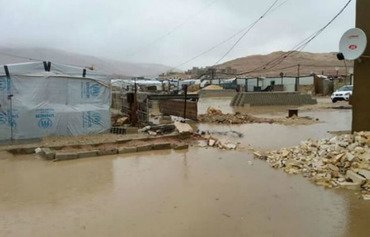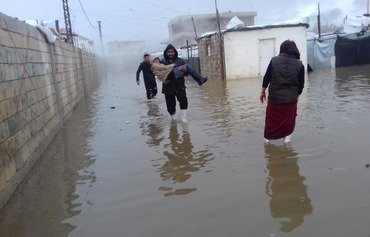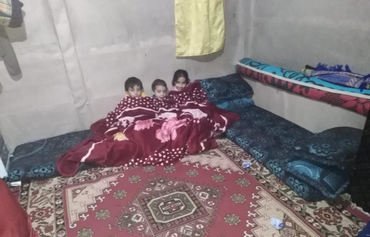BEIRUT -- Syrian refugees residing in al-Wafa al-Omani camp in the Lebanese border town of Arsal awoke on the morning of October 5 to a tent fire caused by a tea kettle that quickly spread to neighbouring tents.
Before it was successfully contained, three and a half hours later, the conflagration destroyed 93 tents, leaving 235 refugee families without shelter.
In mid-September, camp residents learned that due to a funding shortfall, per capita water allocations had been reduced from 27 litres a day to 7.5 litres.
Water is supplied to the camp by the United Nations children's fund (UNICEF), through two intermediary Lebanese organisations.
![The charred remains of a tent are seen here following an October 5 fire that ripped through al-Wafa al-Omani camp in Arsal. [The Voice of Syrian Refugees in Lebanon]](/cnmi_am/images/2022/10/17/37774-arsal-charred-tent-600_384.jpg)
The charred remains of a tent are seen here following an October 5 fire that ripped through al-Wafa al-Omani camp in Arsal. [The Voice of Syrian Refugees in Lebanon]
![An October 5 tent fire caused severe damage in al-Wafa al-Omani camp in Arsal, consuming tents and their contents, including mattresses, clothes and provisions. [The Voice of Syrian Refugees in Lebanon]](/cnmi_am/images/2022/10/17/37776-arsal-wafa-omani-600_384.jpg)
An October 5 tent fire caused severe damage in al-Wafa al-Omani camp in Arsal, consuming tents and their contents, including mattresses, clothes and provisions. [The Voice of Syrian Refugees in Lebanon]
Visiting the Arsal camps on Wednesday (October 12), with a delegation of international organisations, Minister of Public Health Firas al-Abyad announced that UNICEF will soon raise the amount of water provided.
But many camp residents still fear they are in a precarious situation.
Between the water reduction and burning tents, a tragic picture emerges of the plight of Syrian refugees in Arsal camps at the advent of winter, coinciding with a cholera outbreak that on Wednesday claimed its first victim in Lebanon.
Cholera, which causes potentially deadly diarrhoea, is contracted by ingesting food or water contaminated with a bacterium carried in human faeces and spread through poor sanitation and dirty drinking water.
Clean water is needed to confront this disease.
Scene of devastation
"An unmarried youth living in a tent by himself put a teapot on a gas burner and left his tent," said al-Wafa al-Omani camp's top security official Maher al-Hasiki.
"He was shocked to see the fire engulf his entire tent and quickly spread to other tents," he told Al-Mashareq, noting that the fire broke out at around 6 am.
"All who were in the surrounding tents were asleep, and woke up terrified to see the fire surrounding them, so they went outside in their pajamas and were unable to save anything from their tents," al-Hasiki said.
They tried to fight the fire, he said, but there was not enough water in the tanks to extinguish it, so it raged until it was finally put out by the fire brigade at 9:30 am.
"The fire destroyed a total of 93 tents and left 235 families homeless. They lost all their clothes, blankets and supplies, and now live in tents with other refugee families whose situation is not much better than theirs," al-Hasiki said.
He attributed the rapid spread of the fire to "the [poor] quality of the tents, which are made of plastic sheets and highly flammable wood, and the very low amount of water in the tanks".
Syrian refugee Zahra Muhammad Bakr Mohebeddine's tent was burned down.
"My family, including my son, his wife and their seven children, were asleep when the fire burst into our tent," she told Al-Mashareq. "We went outside in our pajamas and could not get anything out of the tent."
"Everything was burned: our clothes, mattresses, blankets, food aid, bags, books and my grandchildren's school clothes," she added, describing the incident as "a new calamity that has befallen us, as if we needed more calamities".
Syrian refugees despondent
Around 70,000 refugees reside in the Arsal camps, sharing about 9,000 tents -- a situation that is concerning given the current outbreak of cholera in Lebanon and the potential for other infectious diseases to spread.
In light of the drastic reduction in water, the Syrian Network for Human Rights has appealed for donor organisations to increase their support to Arsal refugees and enable UNICEF to increase the daily per capita allocation.
Syrian refugees are "stunned, confused, despondent and horrified at this unjust decision and its future consequences for them, their families and their children", Voice of Syrian Refugees in Lebanon head Abu Ahmad Saiba told Al-Mashareq.
"After we, as Syrians, were subjected to attempted murder with all kinds of weapons, including the chemical weapons used by the regime against us -- which forced us to seek refuge in Arsal, where we found some safety -- we now face the danger of death from lack of water," he said.
He said the water cutoff "has affected 70,000 Syrian refugees living in plastic tents designed primarily to serve as temporary living quarters".
Syrian refugees have been living in these tents for 10 years, he said, "after escaping the death barrels that were being dropped on their heads and continuous bombardment" at the hands of the Syrian regime.
Saiba said the reduction of the amount of water allocated to the refugees of Arsal "coincided with the outbreak of cholera, and there is a need for clean water to keep the spectre of this disease away from our children".
"We are about to face a harsh winter," he said.

![A child stands amid the charred remains of a tent after a fire broke out on the morning of October 5 in al-Wafa al-Omani camp in the Lebanese town of Arsal, destroying a large number of tents and displacing the families living in them. [The Voice of Syrian Refugees in Lebanon]](/cnmi_am/images/2022/10/17/37773-arsal-fire-tent-600_384.jpg)






